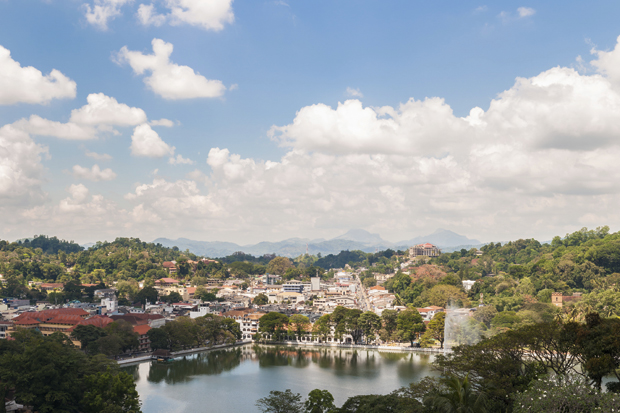In the bar of the Hotel Suisse, perched above the lake in Kandy (pictured), high up in Sri Lanka’s Hill Country, a driver touting for business smiles to reassure me that the British ‘left us many good things’. Trains, roads, the English language. And cricket, I remind him, ‘Oh yes, sir, cricket.’ I wonder what he says to French or Australian tourists.
The Hotel Suisse was used as Louis Mountbatten’s South-East Asia Command headquarters in the second world war; these days it has something of the feel of an old-fashioned and slightly eccentric English prep school.
If the Hill Country is not quite the last redoubt of Sri Lanka’s British past, it remains the district in which it is most palpable. For instance at Nuwara Eliya, at nearly 6,000ft, Sri Lanka’s highest settlement, the hotels are named Windsor, Glendower, the Hill Club and so on. There is a risk of tweeness amid the tea plantations and the manicured lawns. A modern-day British visitor may easily imagine himself back in Edwardian Ceylon as a provincial administrator sipping tea on a fan-cooled verandah. It is a Somerset Maugham-inspired idle fancy, of course, but still an attractive one.
The best, though far from the fastest, way to reach Kandy is by rail. The 75-mile journey takes four hours by rattling, wheezing, overcrowded train. Frequent stops between stations leave the impression of an over-worked diesel locomotive needing to pause for breath. In second- and third-class carriages, old women are compelled to stand much of the way but men give up their seats to novice Buddhist monks.
If the lush peace of the Hill Country is still Ceylon, Colombo is Sri Lanka. Crowded, modernising, cacophonous. In the capital huge hoardings advertise the imminent construction of ‘luxury’ condominiums. The five-star Shangri-La hotel will be finished soon and across Sri Lanka’s capital there is a sense of a city on the make. Modernity is impatient with charm, perhaps incompatible too. Yet only churls, or foreigners, can really disapprove of this. The economy is growing by 6 per cent a year as international investors take advantage of a boom fuelled, at least in part, by the cessation of the country’s long-running civil war.
Much of that money comes from China; another example of Beijing’s investment in its own ‘soft power’. Chinese money has built an expressway linking Colombo with Galle. More roads are planned. Beijing is also helping to extend and modernise the railway network. This, like so much else, is an investment designed to purchase international tolerance for China’s own excesses.
It also means Sri Lanka, an island about the size of Ireland, is becoming smaller. The construction boom is not limited to Colombo and the resorts that dot the island’s west coast between Colombo and Galle. Along its southern counterpart new hotels and guest-houses are being built at such a rate that the visitor is left to wonder how much longer Sri Lanka can remain an ‘undervisited gem’. Improvements to infrastructure will boost the economy; they also increase the sense that Sri Lanka should best be visited before everyone else recognises the attraction of reliable sun, sand and whale-watching.
Best not to speak of the war, however. As David Cameron discovered last November, the Sri Lankan authorities would rather you ignored that. The future is tourism and tourists are put off by talk of war crimes. It is not difficult to find Sri Lankans who take the view that what critics deem atrocities is more properly understood as doing what, or rather whatever, was needed to defeat the Tamil Tigers. Besides, they shrug, it’s history now and why should it concern you? Why should Sri Lanka be held to a different standard than other Asian countries that have experienced conflict and atrocities? On the south coast, in any case, the war feels as distant as the British empire. The recent past can be a foreign country too.
Back in Kandy, the trumpet tree planted in the botanical gardens by Chou En-Lai in 1957 seems to be growing rather more vigorously than the Ficus krishnae planted by Queen Elizabeth three years earlier.
Got something to add? Join the discussion and comment below.
Get 10 issues for just $10
Subscribe to The Spectator Australia today for the next 10 magazine issues, plus full online access, for just $10.
You might disagree with half of it, but you’ll enjoy reading all of it. Try your first month for free, then just $2 a week for the remainder of your first year.















Comments
Don't miss out
Join the conversation with other Spectator Australia readers. Subscribe to leave a comment.
SUBSCRIBEAlready a subscriber? Log in